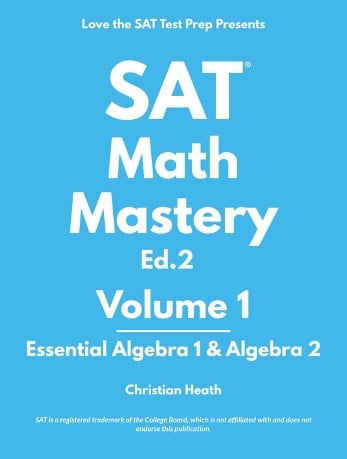If you’ve spent any time preparing for the digital SAT, you’ve noticed that there is a calculator right in the interface for the math sections. It’s tempting to use, especially if you don’t fully trust your mental math skills or you’re not completely comfortable with harder algebra and coordinate geometry questions. But should you use it? And if so, when? While calculators can sometimes be useful on the SAT and can sometimes shave a few seconds off a problem, they can also lead test takers astray. Rounding the values for 𝝅 or √2 may lead to incorrect responses, and typing numbers and operations too quickly can hide key concepts and result in careless mistakes. For tests like the SAT, where there’s no partial credit and you can’t show your work, the calculator can be both a blessing and a curse.
COllege Admissions News and ACT / SAT Strategy
Stay current with the latest undergraduate college admissions news and proven ACT and Digital SAT strategies.
How the New ACT Compares to the Digital SAT
Over the past 8 years, as the SAT has undergone two massive updates, the ACT has generally remained static in the turning world of college admissions. Any changes to its format have been comparatively minor, making it relatively straightforward to prepare for. But, as of July 15th, 2024, the ACT has announced some fairly extensive changes that will be rolled out in 2025-26. In this article, we will summarize those changes and consider how they might impact a student’s decision to take the ACT vs. the SAT.
Get Digital SAT Reading Practice Questions from Free GRE Resources
Two years ago, when College Board announced that the new Digital SAT would abandon dreaded long-passage reading comprehension questions in favor of a shorter, quicker, mixed verbal section, thousands of high school sophomores and juniors breathed a collective sigh of relief. Six paragraph science passages, plot-free fictional excerpts, and paired historical texts with flowery opaque language would all be retired with few lamenting their absence from the new exam. After all, these new passages were going to be easy! One and done! How could it possibly be difficult to guess the main idea of a five-line passage?
End of Test Optional Part 2: Stanford to require ACT or SAT for Fall 2025 applicants
Earlier this spring, we at MyGuru declared that test optional college admission policies were coming to an end for high school students applying to top American universities. As part of the upcoming 2024-25 application cycle beginning this fall, most of the Ivy League and a notable number of elite universities across the United States are once again requiring an ACT or SAT score. Now, Stanford has quietly announced (in a classic Friday news dump) that it too will be reinstating a standardized testing requirement for undergraduate applicants, but beginning in 2025, making this the final test optional application cycle for the Cardinal. This particular decision is important for two reasons:
- It pushes the timeframe for application policy changes back a year
- It puts Stanford in direct opposition to its California public university rivals
How to Study for the New Adaptive Digital SAT
This year, College Board—the organization responsible for designing and administering the SAT—has made several massive changes to the format of the test. While the SAT has always improved and refined the exam, this year’s changes are going to change the ways high school students all over the world prep for the standardized exam. If you’re planning to apply to college in the near future, then you’ll want to make sure you’re fully prepared for the new SAT.
Digital ACT vs. In-Person ACT: Which Is Better?
Since 1959, the ACT has helped high school students demonstrate college readiness and qualify for scholarships. But in February 2024, ACT (which is also the name of the organization that designs and administers the exam) launched its biggest change in years: offering a digital version of the ACT as an optional alternative to the classic pencil and paper exam format.
End of Optional ACTs & SATs
With Harvard and Caltech joining the ranks of selective colleges and universities requiring a standardized test once again as part of the 2024-25 application cycle, MyGuru is more than comfortable asserting that all high schoolers planning to attend college should once again plan to take either the ACT or SAT. While many applicants will see this as a negative (who wants to take a test on a weekend, right!?), this return to standardized testing requirements has been supported by each of the institutions reinstating the exams with data illustrating that test optional policies have actually harmed the at-risk and lower income students that they purportedly were intended to help.
How Test Optional Policies Diminish University Authority
This February, Dartmouth and Yale announced the return of standardized testing requirements as part of their undergraduate application processes. Both institutions provided rigorous statistical analysis illustrating that standardized tests remain the single best predictor of student performance upon admission, as well as evidence that removing the standardized testing requirement, contrary to popular belief, actually led to a decrease in admissions of lesser-served student populations. Still, despite overwhelming evidence, these decisions have been met with both approval and derision as various constituencies project larger philosophical debates onto the issue of standardized testing in college admissions.
Should I Submit ACT or SAT Scores to Test-Optional Schools?
If you’re planning to apply to college in the near-future, you’re probably thinking a lot about the SAT and/or the ACT, the two standardized tests colleges have been using to make admissions decisions for generations. And yet, for this current generation of students, the college admissions landscape has a new feature: the ability to apply test-optional. More and more colleges and universities are offering students the option of not submitting either SAT or ACT scores as part of their admissions materials.
SAT vs ACT: Key Differences
Should I take the ACT or the SAT? This is one of the most common questions students have when they begin to consider the college application process.
How Does Hiring an ACT or SAT Tutor Improve Test Scores?
Getting a high score on the ACT or SAT can be the difference between getting admitted to your preferred college or university or getting rejected. While certain institutions have decided to become test-optional, great scores on these standardized tests remain highly appreciated by admissions officers around the United States and abroad. In fact, even at test optional universities and colleges, a high ACT or SAT score is still one of the most important drivers of admissions decisions.
How to Hire the Best ACT or SAT Tutor for You
Preparing for the ACT or SAT can seem daunting, but remember, these exams are your chance to improve the likelihood of admission to your dream college. In fact, if your GPA isn’t as high as it could be, this could be the chance you have at giving yourself an edge in the admissions process. While many colleges are going test optional, a strong ACT score can only help you show off your academic prowess and readiness to thrive in at the university level. Though the ACT can be challenging, and perhaps you’ve scored less-than-ideally on a practice test, utilizing an ACT tutor can noticeably improve your score. An in-person or online ACT tutor can really kick-start your ACT prep process, providing you with the ACT study plan you need to be effective and efficient when you self-study for the ACT. After all, for every hour you spend with an ACT or SAT tutor, you should spend three hours self-studying.
Should You Hire an SAT Tutor?
A recent celebrity college admission scandal saw actresses Lori Loughlin and Felicity Huffman being charged with bribery and fraud, accused of going to devious and illegal measures to ensure their kids were admitted to colleges that they might not otherwise have been accepted to. The scandal illuminated the lengths to which some students and parents will go to ensure attendance at their school of choice. While most of us won’t break the law, there are certainly increased measures one can take to broaden their chances for university admissions. Scoring particularly well on the SAT is one obvious tactic. Some students chase this goal via significant self-study; others pay for private SAT tutors and SAT prep courses.
Emailing College Coaches: What's the Etiquette?
 For high-school students with aspirations of playing college sports, it is crucial to connect with college coaches. Many students envision a “He Got Game” scenario, where coaches from around the country aggressively pursue the recruit until they’ve secured a commitment. But for 99% of student-athletes, the process is exactly the opposite: you must take the initiative to form relationships with these coaches. Otherwise, you’ll have heard from few, if any, college coaches by the time graduation rolls around.
For high-school students with aspirations of playing college sports, it is crucial to connect with college coaches. Many students envision a “He Got Game” scenario, where coaches from around the country aggressively pursue the recruit until they’ve secured a commitment. But for 99% of student-athletes, the process is exactly the opposite: you must take the initiative to form relationships with these coaches. Otherwise, you’ll have heard from few, if any, college coaches by the time graduation rolls around.
How to Improve your SAT Score (or ACT Score) Through Deliberate Practice
If you really want to get a high SAT score, perhaps the most important thing to keep in mind is that “talent” or “IQ” matters far less than you think. There are not really “math people” or “natural readers.” What matters is the amount and quality of your SAT prep, which of course is influenced in large part by how passionate and genuinely interested you are in doing well on the SAT or ACT. So if you want to get a 99th percentile SAT score or a 34 on the ACT, it’s possible that you can do it.
The Best Way to Prepare for the ACT or SAT Might Surprise - and Calm - You
 What is the best way to prepare for the ACT or SAT?
What is the best way to prepare for the ACT or SAT?
Well, it’s true arriving at a useful answer to this question does depend a lot on your timing and the context. If you are a junior with average grades, but aspire to get a high SAT score, and you take the SAT in 30 days, this article should be able to help adopt the right mindset and bring some calm and confidence to exam day. But practically, with only 30 days until the exam, you should be considering online SAT tutoring or an SAT crash course to get the best SAT score you possibly can. SAT tutoring and courses can and will help you get a higher score.
Exploring SAT Tutoring Rates: Is SAT Help from a Private Tutor Worth It?
 Since we are an SAT tutoring company, you might expect us to argue that hiring an SAT coach is almost always worth it. But we don’t believe that to be true.
Since we are an SAT tutoring company, you might expect us to argue that hiring an SAT coach is almost always worth it. But we don’t believe that to be true.
Early College Planning: What Matters and How to Get Started
 Parents of high schoolers frequently ask me when the best time is to begin planning for college. My answer is usually “now!” which often, and more importantly, leads to talking about “how.”
Parents of high schoolers frequently ask me when the best time is to begin planning for college. My answer is usually “now!” which often, and more importantly, leads to talking about “how.”
SAT Math Mastery
2 Key Questions You Should Ask When Searching For a College
COVID-19 has changed every aspect of our world. From the increased time at home for everyone to students learning from home via Zoom, it has been a year of transition and change, particularly for high school and college students. Many colleges, for example, have waived ACT and SAT requirements completely during the admissions process, likely opening up new possibilities for tens of thousands of students. But hopefully, the COVID-era won’t last forever. By the time students applying to college in the next few months actually head to school, Coronavirus may be in the rearview mirror.
College Applications: Making a Difference During the Pandemic
 When applying to competitive colleges, every aspect of your application is carefully scrutinized. We’ve interviewed several admission officers during the pandemic and asked them what they look for in students. All said the same thing: They are looking for students who step up and make a difference (even a small one) in their community.
When applying to competitive colleges, every aspect of your application is carefully scrutinized. We’ve interviewed several admission officers during the pandemic and asked them what they look for in students. All said the same thing: They are looking for students who step up and make a difference (even a small one) in their community.
How to Customize Your Online SAT Prep
 For ambitious students looking to get into a good college and launch a successful career, SAT prep is a time-honored tradition. For years, increasing numbers of students have been turning to online SAT prep to get themselves ready for test day. In the age of coronavirus, online SAT prep has gone from a convenience to a necessity. But with more and more test prep resources coming online every day, how do you know you’re getting the best online SAT prep for you? Your personal preferences, learning style, financial situation, and more can influence whether online SAT tutoring or online SAT courses are a better fit.
For ambitious students looking to get into a good college and launch a successful career, SAT prep is a time-honored tradition. For years, increasing numbers of students have been turning to online SAT prep to get themselves ready for test day. In the age of coronavirus, online SAT prep has gone from a convenience to a necessity. But with more and more test prep resources coming online every day, how do you know you’re getting the best online SAT prep for you? Your personal preferences, learning style, financial situation, and more can influence whether online SAT tutoring or online SAT courses are a better fit.
How Much Does an SAT Tutor Cost?
 By the time you’re a junior or senior in high school, you’ve probably already heard a lot about the importance of the SAT. This is the standardized test most colleges and universities accept for admissions purposes. Since the SAT has so much influence over your higher education and, therefore, your career, many students work with a tutor for their SAT prep. This is an excellent idea, and something every future SAT-taker would benefit from. But of course, when it comes to selecting a tutor, you’ll have to consider not only the quality of the tutoring, but also the SAT tutoring cost. If you’ve never gone down this road before, there’s a huge range of SAT tutoring rates. In this article we explore what you should expect to pay for your SAT prep cost, and what the rate says about the quality of the education.
By the time you’re a junior or senior in high school, you’ve probably already heard a lot about the importance of the SAT. This is the standardized test most colleges and universities accept for admissions purposes. Since the SAT has so much influence over your higher education and, therefore, your career, many students work with a tutor for their SAT prep. This is an excellent idea, and something every future SAT-taker would benefit from. But of course, when it comes to selecting a tutor, you’ll have to consider not only the quality of the tutoring, but also the SAT tutoring cost. If you’ve never gone down this road before, there’s a huge range of SAT tutoring rates. In this article we explore what you should expect to pay for your SAT prep cost, and what the rate says about the quality of the education.
SAT & ACT Coronavirus Update
 College Board Cancels all Spring SAT Exams
College Board Cancels all Spring SAT Exams
Having already cancelled its May 2 SAT test date, CollegeBoard announced this past week that it will be canceling its previously scheduled June 6 test date worldwide as well. This means that there will not be another SAT exam offered until August 29 at the very earliest, so nearly six months will have passed between possible SAT administrations for juniors planning to take the exam this year. In making this announcement, CollegeBoard also indicated that it is preparing an online version of the exam in the fall should in-person administrations still be prohibited by the pandemic. This follows in the footsteps of announcements from both GMAC and ETS that, at least temporarily, each organization would be offering and at-home online GMAT and an at-home online GRE exam respecctively.
Self-paced SAT Prep: Pros and Cons
 In a previous article, we discussed the three main options to choose from when preparing for the SAT exam: self study, 1-1 tutoring, and group classes. In this post, we take a deeper look at self-paced SAT prep courses specifically, the niche’s top providers, pros and cons, and how to make the most of your experience should you decide to take one of these courses.
In a previous article, we discussed the three main options to choose from when preparing for the SAT exam: self study, 1-1 tutoring, and group classes. In this post, we take a deeper look at self-paced SAT prep courses specifically, the niche’s top providers, pros and cons, and how to make the most of your experience should you decide to take one of these courses.
SAT Prep Options: Self Study vs. SAT Tutoring vs. Group Classes
 When preparing for the SAT exam, you must decide pretty early on which study approach you will take. Although you can always switch strategies if something isn’t working for you or you don’t achieve the score you want, we’re hoping this article will help you make the right decision without unnecessarily wasting time and money on the wrong SAT prep method. Below you’ll find the three most prominent SAT prep options: self study, 1-1 tutoring, and SAT classes, as well as the pros and cons of each.
When preparing for the SAT exam, you must decide pretty early on which study approach you will take. Although you can always switch strategies if something isn’t working for you or you don’t achieve the score you want, we’re hoping this article will help you make the right decision without unnecessarily wasting time and money on the wrong SAT prep method. Below you’ll find the three most prominent SAT prep options: self study, 1-1 tutoring, and SAT classes, as well as the pros and cons of each.
SAT Review Series: Reading Comprehension
In the first post of our SAT review video series, we approach working through a standard reading comprehension question.
The SAT reading comprehension section can often be a time crunch for many students. This video demonstrates a systematic approach to quickly reading and analyzing a passage in order to answer questions.
Preparing for the SAT/ACT: How to Make your Own Study Schedule
 No matter how many times your parents have repeated it to you, it never quite sinks in – If you fail to plan you plan to fail. While this feels a bit dramatic, in a test like the SAT or ACT it is important to realize that preparation can have a significant benefit on your score and on opportunities that stem from this such as college admission and scholarships. While many students have performed well in high school, standardized admissions tests can be a limiting factor because students often fall into a few common traps, such as the idea that being a good student translates directly into a high performing standardized test taker. While this may be true for some students, it often is not the case. College admissions exams often require knowledge on how to study for and take a standardized exam. The best way to overcome this hurdle is by creating a study schedule and planning for test day ahead of time.
No matter how many times your parents have repeated it to you, it never quite sinks in – If you fail to plan you plan to fail. While this feels a bit dramatic, in a test like the SAT or ACT it is important to realize that preparation can have a significant benefit on your score and on opportunities that stem from this such as college admission and scholarships. While many students have performed well in high school, standardized admissions tests can be a limiting factor because students often fall into a few common traps, such as the idea that being a good student translates directly into a high performing standardized test taker. While this may be true for some students, it often is not the case. College admissions exams often require knowledge on how to study for and take a standardized exam. The best way to overcome this hurdle is by creating a study schedule and planning for test day ahead of time.
Specialized Preparation Needed for the SAT Chemistry Subject Test
 Students who decide to take the SAT Chemistry subject test generally feel that they are well suited for the test because they are doing well in the high school chemistry course they are taking at their high school. What I have found though is that they may not be aware of the specialized preparation that is needed in order to get a top score on the exam beyond their study for the course they are taking at school. There are several reasons for the need for specialized preparation for the exam. This article explains what those are and what the student can do to be better prepared for the test.
Students who decide to take the SAT Chemistry subject test generally feel that they are well suited for the test because they are doing well in the high school chemistry course they are taking at their high school. What I have found though is that they may not be aware of the specialized preparation that is needed in order to get a top score on the exam beyond their study for the course they are taking at school. There are several reasons for the need for specialized preparation for the exam. This article explains what those are and what the student can do to be better prepared for the test.
AP Tests & European Degrees
 Plenty of students take AP courses as a way to prove to colleges that they are capable of handling exactly the sort of work that universities demand of students. However, while taking the courses themselves is often quite important in admissions decisions at American universities, the scores often matter more for the purpose of getting advanced credit. Therefore, for many students, the difference between a 4 and a 5, depending on the university that he or she ultimately ends up attending, is not that vast.
Plenty of students take AP courses as a way to prove to colleges that they are capable of handling exactly the sort of work that universities demand of students. However, while taking the courses themselves is often quite important in admissions decisions at American universities, the scores often matter more for the purpose of getting advanced credit. Therefore, for many students, the difference between a 4 and a 5, depending on the university that he or she ultimately ends up attending, is not that vast.
The Art of Being Productive in High School to be a More Attractive College Applicant (Part 2)

In our last blog post on this topic, we explored why today’s high school students must be so productive in high school. Getting good grades isn’t quite enough anymore. You need to show a variety of interests and ideally achieve leadership positions outside the classroom to maximize your chances of admission to a top college. We offered a six-step process to being more productive in high school:
The Art of Being Productive in High School to be a More Attractive College Applicant (Part 1)

Most students know they need to be productive, because getting into an excellent college requires much more than good grades nowadays. It now requires a well written application highlighting many interests and accomplishments, including a high GPA.
Maximizing Meetings with Advisors & Professors as a College Student
 When I was a freshman advisor at Duke, most of my advice dealt with issues such as feeling overwhelmed academically, struggling to make friends and figuring out majors and careers. Looking back, however, one issue that I never discussed with my advisees but wished I had was how to make the most of a meeting. I know what you’re thinking: Huh? What do meetings have anything to do with being a college freshman? Allow me to explain.
When I was a freshman advisor at Duke, most of my advice dealt with issues such as feeling overwhelmed academically, struggling to make friends and figuring out majors and careers. Looking back, however, one issue that I never discussed with my advisees but wished I had was how to make the most of a meeting. I know what you’re thinking: Huh? What do meetings have anything to do with being a college freshman? Allow me to explain.
How to Excel in College While Employed in 11 Easy Steps
 Are you working and taking college classes at the same time? If so, you probably already know how challenging it can be. But don’t worry. Even with limited time, you can succeed at both school and work. In the next few minutes, you’re going to learn 11 easy steps to follow to help you draw the best out of yourself in both settings. Since you’re a busy student, I’m sure you don’t have any time to waste. So, let’s get started!
Are you working and taking college classes at the same time? If so, you probably already know how challenging it can be. But don’t worry. Even with limited time, you can succeed at both school and work. In the next few minutes, you’re going to learn 11 easy steps to follow to help you draw the best out of yourself in both settings. Since you’re a busy student, I’m sure you don’t have any time to waste. So, let’s get started!
Dealing with Difficult Reading Passages on the SAT and ACT
 The SAT and the ACT are not designed to be fun tests. That’s probably really obvious to you already! These tests takes forever, have a billion questions, and will turn you into a zombie for the rest of your Saturday.
The SAT and the ACT are not designed to be fun tests. That’s probably really obvious to you already! These tests takes forever, have a billion questions, and will turn you into a zombie for the rest of your Saturday.
How a College Mindset Will Make You a Better College Candidate
 Many high-schoolers picture big lecture halls and pulling all-nighters with a pile of books in the library when the term college academics comes up. The fact of the matter is that few high schoolers have any idea what to expect from college, and end up pretty shocked for most of the first semester.
Many high-schoolers picture big lecture halls and pulling all-nighters with a pile of books in the library when the term college academics comes up. The fact of the matter is that few high schoolers have any idea what to expect from college, and end up pretty shocked for most of the first semester.
Common Wrong Answer Choices on the SAT and ACT Reading
Many to-be ACT and SAT takers absolutely dread the Reading section for a series of totally fair reasons. The passages can be mind-numbingly boring. Questions about tone and author’s purpose seem cruelly subjective. So many of the questions have various answer choices that seem fine.
ACT Science: Extracting Signals Through Noise to Improve Your Score
“Ever thought about taking the ACT?”
SAT Math: An Overview
 Studying for the SAT can seem like a daunting undertaking, but all you really have to do to master it is break it up and take it one section at a time. Today, we will be highlighting the Math section of the SAT.
Studying for the SAT can seem like a daunting undertaking, but all you really have to do to master it is break it up and take it one section at a time. Today, we will be highlighting the Math section of the SAT.
Should You Answer SAT Questions in Order?
SAT/ACT English: A Common Language
 As the ACT has come into its own over the past 10-20 years as a fully recognized college admissions test alongside the SAT, students increasingly weigh both of these exams to assess which one may be better suited for them, sometimes opting for both. Preferences (and rumors) abound, of course: “There are too many trick questions on the SAT math!” or “I'd take the ACT, but the science section is a deal-breaker!” While these sentiments may (or may not) be true, depending on the student, what's certainly true is that they contribute heavily towards apprehension over which test to take! There is, however, one section that is nearly identical on each test, and offers a way to kill two birds with one stone in your college admission exam prep. That's the grammar/rhetoric section, referred to as the “English” section in the ACT, and the “Writing and Language” section on the SAT. CollegeXpress offers an in-depth analysis of the similarities and differences between the two tests.
As the ACT has come into its own over the past 10-20 years as a fully recognized college admissions test alongside the SAT, students increasingly weigh both of these exams to assess which one may be better suited for them, sometimes opting for both. Preferences (and rumors) abound, of course: “There are too many trick questions on the SAT math!” or “I'd take the ACT, but the science section is a deal-breaker!” While these sentiments may (or may not) be true, depending on the student, what's certainly true is that they contribute heavily towards apprehension over which test to take! There is, however, one section that is nearly identical on each test, and offers a way to kill two birds with one stone in your college admission exam prep. That's the grammar/rhetoric section, referred to as the “English” section in the ACT, and the “Writing and Language” section on the SAT. CollegeXpress offers an in-depth analysis of the similarities and differences between the two tests.
College Essay Applications: Why YOU Need an Editor
What are you selling?
When you are preparing to submit your college applications, keep in mind that what you’re selling is YOU. Figuratively speaking, of course....
Applying to College is a Process
 You may have heard it said before that applying to college is a “process,” and it really is. Additionally, every student’s process is different. However, there are some typical stages a student may go through to find their ideal college, and in this blog we outline them for you.
You may have heard it said before that applying to college is a “process,” and it really is. Additionally, every student’s process is different. However, there are some typical stages a student may go through to find their ideal college, and in this blog we outline them for you.
Getting Underway
We recommend that students seriously begin the college process during their junior year. If students or families are college-focused, there are things freshman and sophomores can do, but they mostly revolve around earning strong grades and getting involved in activities. Toward the middle of junior year, students can kick- off the college process by determining what qualities they want in an ideal college. Students should consider size, location, major, and other factors to create an initial list of schools.
Exploration
During the next stage of the process, students will research potential colleges online, in books, through campus visits and other ways. By learning more about colleges, students can determine which schools they really like and which ones they don’t. They can also determine which criteria are more important than others (ie, “It’s really important to me that the school has an equestrian program, so I’ll look at schools smaller than I initially wanted.”) During this stage, it’s important that students verbalize their goals and be realistic about their expectations. It’s also helpful when families plan college visits and attend college-sponsored information sessions.
Applications
When it comes time to apply to colleges, the stress level can be at an all-time high. Deadlines, essays, resumes, interviews... the list goes on and it can be a lot for a student to manage alone. Parents, school counselors, admission counselors and college counselors are all helpful resources to help students during this time.
Financing College
At some point, hopefully earlier rather than later, families need to have a conversation about the cost of college and how to pay for it. Honesty is the best policy; parents should let students know what their realistic options are. Students may need to add less expensive colleges to the list, apply to schools where they are likely to receive a grant, and/or apply for scholarships.
Decisions, Decisions
The final stage of the process is usually the favorite one, but it doesn’t mean it’s always easy. Once a student has (hopefully) a few acceptances to various colleges, the family needs to sit down and weigh the pros and cons of each school. Sometimes it’s an easy decision, but occasionally it’s really difficult. Families need to have these discussions and come up with a decision that everyone is happy with.
The PSAT: Your First Step to SAT & ACT Success
A Guide To ACT Scoring
Understanding how the ACT is scored is one of the most fundamental aspects of taking the test. Before even stepping foot into the classroom on test day, knowing the scoring for the ACT can help you to outline your studying and set realistic score goals as you are planning for the big day. Let’s dive into our guide for ACT scoring and what you should know right now:
A Guide to Tackling the ACT Reading Section
Reading four lengthy passages and answering 40 questions in a short timespan of 35 minutes can seem overwhelming, especially if you are not familiar with the ACT Reading section and the many tricks that the ACT writers try to confuse test-takers with. However, a little review and practice of a few simple test-taking strategies will give you the skills and confidence necessary to tackle the ACT Reading section.
ACT Science: Sifting Out What Matters (and what doesn’t)
The ACT Science section has a rather misleading name. Perhaps a better name would be the ACT Reading Section Part 2: Science Concepts. The exam requires no prior knowledge of scientific content or concepts. Instead, students are required to interpret data graphs, what the scientific method is and how scientific theories disagree from each other. These are concepts taught in every high school in the country. The ACT is a standardized exam that must provide a level playing field for all applicants, from all demographics across the United States. As such, it may be comforting to know that advanced science concepts such as DNA transcription and translation or the Hardy Weinberg Equilibrium won’t be tested. To succeed on this portion of the exam, exposure to ACT Science questions and practice solving them is critical. The following is an important tip to succeeding on the ACT science section:
5 Keys to Scoring a 30 on the ACT Math Section
Scoring a 30 or above on the ACT Math section is no easy feat; it takes a lot of preparation and practice! In this post, we’ll share with you 5 Key strategies to scoring a 30 or above on the ACT Math section. These strategies are tried and true, and tend to be very effective for students that we have helped prepare for the ACT exam.
ACT Math: A Lesson on Logarithms
What are logs in math? Do you use them to develop a foundation and build like beavers do? No, you don’t. Instead, in math, logs are the “opposite” of exponentials, just as subtraction is the opposite of addition. If I asked you what number (x) to the third power equals 8 (x3 = 8), then you would take the cube root of both sides and tell me the cube root of 8 equals 2.
Now consider this: if I asked you 2 raised to what power (x) gets you 8, how would you solve it? Well, we know that x=3 because 23 = 8, as we saw from the previous problem. But what steps would you take to solve this problem, or any others like it? As I mentioned before, logs are the “opposite”, or the inverse, of exponentials. Thus, one operation can undo the other. Let’s take a look at the relationship between them.
Designing an ACT Study Plan? Here are our Recommended ACT Study Materials
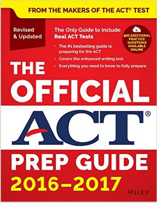 When designing an ACT study plan, one key question is “what materials will I use?” Luckily, the most effective material is also the most inexpensive (more on that later).
When designing an ACT study plan, one key question is “what materials will I use?” Luckily, the most effective material is also the most inexpensive (more on that later).
To begin, it’s helpful to ask yourself one basic question: am I fundamentally comfortable using online materials or not? There are many web-sites and “apps” available to help you prepare for the ACT. But for some people, plain old paper and pencil is still their preferred way to learn. I tend to encourage students to at least consider an online approach, since it’s generally very convenient and because many online resources are “adaptive,” meaning they give you suggested practice content based on how you’ve performed on previous practice problems to build on your strengths and address your weaknesses. But, if an online approach just isn’t for you, don’t force it.
How to Approach Writing Supplemental Essays
Just when you think you’ve made headway on your college applications - filling out your information, getting letters of recommendation, writing your personal statement - supplemental essays hit you. These supplement essays for college can seem overwhelming. Many schools require multiple essays, and many offer multiple prompts. So how should you approach writing supplemental essays?
Stress and Standardized Tests: Coping Strategies
Stress is something that everyone experiences; however, the triggers and manifestations of stress differ for everybody. As illustrated in the Yerkes-Dodson Human Performance Curve, a little stress can be good; it keeps us focused and motivated, and can positively impact performance. However, too much stress can be physically debilitating and can decrease productivity, performance, and cognitive function--a particular issue when engaged in a high cognitive activity, such as standardized tests. While effective time management, productive study habits, and strong organizational skills can help combat stress, there are also coping mechanisms that you can utilize to help mitigate stress.
How to Ace the ACT Writing Section
Writing an essay in 40 minutes can be a daunting task. The ACT graders expect you to write a well-developed, coherent essay about a topic that you may not be familiar with. However, knowing more about the ACT Writing section, and what graders are looking for can help you to prepare for this task effectively.
The Anatomy of Great Online Reputation Management
Every tech-savvy student realizes that there’s a ton of information about them online (most of which they’ve posted themselves) and that this information is widely accessible by their peers. Fewer students consider how their online presence will impact their admissions to colleges or to the work-force. And fewer still consider how they can take control of their online presence to ensure a positive impression of them shines through amongst the cluttered returns of a Google search.
College Application Timeline
SUMMER BEFORE SENIOR YEAR
JUNE
- Take the ACT/SAT
- Take time this summer to volunteer or shadow a professional
JULY
- Go on campus visits to start narrowing down your college list
AUGUST
- Get started on Common App Essay* (brainstorm, outline, drafts)
- Create a college list taking into consideration: academics, graduation rate, majors, size, location, school resources, campus life.
- Be sure to apply to at least 4 schools. Your college list should include at least:
- 1 Safety school (a college you’re confident that you can get into)
- 2 Good Fits (colleges that you’re pretty sure you can get into)
- 1 Reach (a college you have a chance of getting into, but it’s a stretch)
College Essay Writing Tips
Perhaps the most intimidating part of the College Admissions process is composing your personal statement. But, it doesn’t have to be that way, here are some tips to help you out.
Simple but Powerful Test Taking Strategies: Part 1
 Strategy is an intrinsic part of preparing for standardized tests. Without the proper strategies even the most advanced students find themselves performing below their full potential.
Strategy is an intrinsic part of preparing for standardized tests. Without the proper strategies even the most advanced students find themselves performing below their full potential.
Here are a few proven test taking strategies that will take you a long way in your quest for a high score, regardless of the test you’re taking.
A Brief Review of the New SAT
 Three little letters: SAT.
Three little letters: SAT.
For many years now, those three little letters have evoked feelings of dread, fear and anxiety in the minds of countless high school students across the country. We are speaking of course, of the Scholastic Aptitude Test. It is a standardized exam offered by the College Board used in determining college admissions and, in many cases, scholarships to a given institution. The ACT (American College Testing) is also offered and accepted at all four-year institutions just like the SAT.
As many of you may know, the SAT has been around for quite some time now, with the first test being administered on June 23, 1926. To this effect, for the first time in 11 years, the writers of the exam figured it was time their exam was updated and thus, the newly reformatted SAT hit test-takers desks March 2016 for the first time.
This article will give you the full scoop on this new exam, its structure and breakdown, and more specifically, what you need to do differently to make sure you succeed on this new test.
The Hidden Key to College Admissions Success: Staying Organized

Better organization skills can benefit almost anyone in any stage or area of their life.
When some people hear the word organization their first thought is about home organization and a big box store specializing in ridiculously overpriced closet-systems. There are others who seem to find happiness in staying organized; these are the folks who are constantly making lists and crossing things off of them.
For students, developing organizational skills is inherent to achieving academic success whether as a high school freshman studying for final exams for the first time, or a junior taking the first steps in the college admissions process. Applying to college can be particularly overwhelming due to the numerous requirements and deadlines. This process takes place simultaneously with taking AP Exams and working to maintain your GPA among feelings of “senioritis.”
ACT - English: Overview and Basic Strategies
This article provides a quick overview of critical information to know and key strategies to apply to boost your performance on the ACT-English test.
It is organized around three sections: overview, strategies, and concepts.

8 Critical ACT-Math Strategies
In this post we'll share 8 strategies for improving your score on the ACT-Math section. We have worked with hundreds of students, and these ideas are almost always helpful.These strategies are written in a “top 8” list format, but they aren’t necessarily in order. Depending on the student, any given strategy might be more or less effective.

FAQs as a New College Student - Answered
 What’s the best way to meet people?
What’s the best way to meet people?
Some might suggest that the most daunting aspect of college is making friends. Out of thousands of young adults, somehow you have to find a group of like-minded people to spend your time with. I mean, who wants to be alone throughout all four years of college? Chances are, you’ll be happier the more connections you make. It’s like high school all over again, except with a larger pool to weed through.
The Long Awaited Arrival of a Student’s Honest Review of 'The Standardized Test'
 As a rising senior in college, I have had my share of first hand experience with standardized tests. Through elementary, middle, and high school, students in my state (like most states) are required to take assessment exams. When I had finally suffered through my last of those, the SATs and ACTs were right around the corner ready to greet me with open arms. I, on the other hand, wasn’t sure I was quite as ready to accept the challenge.
As a rising senior in college, I have had my share of first hand experience with standardized tests. Through elementary, middle, and high school, students in my state (like most states) are required to take assessment exams. When I had finally suffered through my last of those, the SATs and ACTs were right around the corner ready to greet me with open arms. I, on the other hand, wasn’t sure I was quite as ready to accept the challenge.
Even now, it seems as if new variations of standardized testing are being created yearly. Although a lot of controversy has surrounded the validity of this method of evaluation, for better or for worse, this is our country’s preferred approach. Instead of fighting it, I learned how to live with it. And this is an evaluation of my experience. Hopefully, if you yourself have not yet experienced the SATs and ACTs, or other similar standardized tests, this article will help ease your fears and confusion.
Tips for Choosing the Right College
Tips to Boost Your ACT Score
 Since the ACT Writing test is optional, many students question whether schools even care about it. With the ACT clocking in at almost three hours, it can be tempting to skip the essay instead of spending an additional 30 minutes on the test. However, many schools require you to take the ACT with Writing - and even if it is not mandatory at the schools you are applying to, taking it anyway may show initiative and make you a more attractive candidate.
Since the ACT Writing test is optional, many students question whether schools even care about it. With the ACT clocking in at almost three hours, it can be tempting to skip the essay instead of spending an additional 30 minutes on the test. However, many schools require you to take the ACT with Writing - and even if it is not mandatory at the schools you are applying to, taking it anyway may show initiative and make you a more attractive candidate.
SAT Math: Solving Impossible Math Problems
 The SAT sometimes approaches math a bit differently than we’re used to in math class. One of these differences in approach is in the way some SAT math problems ask us to solve for relationships between variables, rather than the value of one particular variable. These problems can seem very challenging, or even downright impossible, at first glance, because they often give us multiple variables but only one equation.
The SAT sometimes approaches math a bit differently than we’re used to in math class. One of these differences in approach is in the way some SAT math problems ask us to solve for relationships between variables, rather than the value of one particular variable. These problems can seem very challenging, or even downright impossible, at first glance, because they often give us multiple variables but only one equation.
One thing we learn in math class when studying systems of equations is that in order to solve for 2 variables, we usually need 2 separate equations; to solve for 3 variables, we need 3 separate equations; and so on. Certain SAT math problems will appear to violate that general rule and ask us to do something that’s supposed to be impossible, like solving for 2 variables with only 1 equation. When we look more closely at such problems, though, we realize that the SAT is not really asking for the value of each individual variable involved. Instead, we’re asked to find the value of the sum, product, or some other relationship involving 2 or more variables.
Should I mention religion in my college essay?
 The short answer is this: it’s okay to discuss religion in your essay as long as the take-away (or values) promoted in the essay are universal. Here’s what I mean:
The short answer is this: it’s okay to discuss religion in your essay as long as the take-away (or values) promoted in the essay are universal. Here’s what I mean:
How Do I Write the “Why Us?” Essay?

1. Don’t write about the school's size, location, reputation or the weather.
Why? Because that's what half of America is writing about. Take a hint from Emory University, whose “Why us” essay used to read:
How to Self-Study for an AP Exam

Unfortunately, not all high school AP programs are created equal. Even though colleges put your AP exams in the context of how many were offered at your school, there are major tuition savings to be had from doing well on more AP exams. If you find yourself wanting to take an AP exam that your school does not offer, here is how you can ace the exams on your own:
Pick Your Textbook
This is an important decision as it will form the basis of your self-study journey, especially for exams that have recently gotten a facelift from the CollegeBoard. For such exams, like AP Biology in the 2012-2013 school year, you will want to Google “SUBJECT NAME textbook correlations”.
For most redesigned exam, the CollegeBoard collects correlation assessments from textbook publishers to ensure that their books align with the exam frameworks. This is usually the ideal way to pick the best textbook.
If a comprehensive correlations document is not available, then you can look for the “SUBJECT NAME example textbook list”, which is more commonly available. Get the latest edition whenever possible and if you can’t decide, just go with whichever one you think has the most reputable publisher behind it.
Either way, do not spend too much time obsessing over the textbook you use – the important thing is how you will use it.
What Students Can Learn from the 2016 SAT Re-Design
Re-Thinking Test Prep, Applications, & Admissions
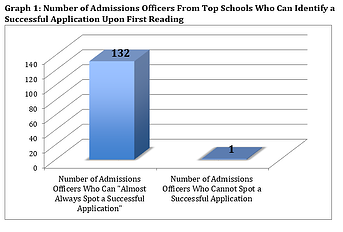
This is a guest post by Joel Butterly, CEO of inGenius prep.
10 Tips for Presenting Your Best Self To Colleges – Part 2

In part one of this two-part post, I referenced five ways to differentiate yourself in preparation for applying to college.
The first five tips were:
- Do what you love
- Distinguish yourself at school
- Distinguish yourself in your community
- Get a job or an internship
- Do some independent research
10 Tips for Presenting Your Best Self To Colleges – Part 1
 As it gets more and more difficult to be accepted to college, students everywhere are keen to stand out. The good news is that with just a little thought, and some planning, you can. Here's a handy-dandy “top ten” list of sure-fire ways to distinguish yourself when applying to college. In part 1, I’ll share my first five tips, and in part two (to come in a few weeks) I’ll round out my top ten.
As it gets more and more difficult to be accepted to college, students everywhere are keen to stand out. The good news is that with just a little thought, and some planning, you can. Here's a handy-dandy “top ten” list of sure-fire ways to distinguish yourself when applying to college. In part 1, I’ll share my first five tips, and in part two (to come in a few weeks) I’ll round out my top ten.
Writing a Great First Sentence On College Application Essays

Every time a reader picks up a new application, he or she must wonder: "Is this going to be another generic snooze-fest of an essay or the dynamic proclamation of an individual thinker?" Guess into which category you want to fall?
How to Write Effective Supplemental Essays

I recently spoke with a former college admissions officer who mentioned that a lot of applicants fail to give supplemental essays their proper attention. Instead, these students focus all of their energy on the main essay. While it’s obviously important to have a knockout personal statement, overlooking the supplemental essays could be a fatal error in judgment. Every individual piece of your application matters. Here’s how to maximize the positive impact of your college application supplemental essays.
FILL IN THE BLANKS
The personal statement isn’t your life story – it’s one story, hopefully with a lot of character and detail, but still – just one story. The supplements allow you to mine from other stories in your life – various skills, interests, or challenges you’ve overcome. Use your quirks, your passions, and your unique life experiences to give your application greater depth. It’s an opportunity to share another side of yourself – something that wouldn’t necessarily be on your resume. Doing so will give the admissions committee a fuller picture of who you are. Your supplemental essays should help illustrate the many facets of your personality, and you’ll leave the impression of a real person instead of just grades on a page.
How to Determine Which SAT Subject Tests to Take
Recently, a number of students who have worked with MyGuru for ACT or SAT tutoring have followed up asking about SAT subject tests. Their main question has been which SAT subject tests should I take?
5 Simple Ways to Improve Your ACT Test Scores
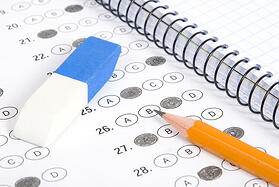
Though there are many factors that play into the college admissions process, your score on the ACT carries a lot of weight. It can influence not only what colleges you get accepted to, but also the availability and amount of scholarship funds, and is therefore not to be underestimated. If you weren’t the best student in high school, and thus don’t have the best grades, doing well on the ACT represents an opportunity to partially make up for less than stellar academic performance in high school. So, it can really be viewed as an exciting opportunity, instead of a stressful requirement.
With that in mind, here are 5 strategies you can apply to get the best score possible.
Strategies 1 and 2: Before the Test
Study Comprehensively
Writing About Your Strengths Without Sounding Arrogant

We’re taught to be modest – not to brag or talk too much about ourselves. But when you write your college essay, you’re forced to do the exact opposite, and that shift can make students uncomfortable. It’s hard to strike the right tone in writing or speaking about yourself, especially when you’re discussing something at which you excel. Here are some tips on how to write about your accomplishments without bragging (hint: they’re all about showing rather than telling).
Show what you’ve learned
Talking about your achievements shouldn’t be a list. It should be a discussion. Focus on just one - or a few - accomplishments instead of listing every single one, and then give more details and context to measure your success. What skills have you developed as a result of excelling at an academic subject, a sport, or hobby? What happened the first time you tried, and how is it different now that you’re more experienced? If you naturally excelled from the start, how have you managed to keep challenging yourself and to hold your interest over time? If you didn’t succeed at first, what kept you from giving up?
How to Get Started with the College Application Process
 Have you thought about starting your college applications this fall? If so, you should spend some time considering which teachers you want to write your college recommendation.
Have you thought about starting your college applications this fall? If so, you should spend some time considering which teachers you want to write your college recommendation.
ACT Math Strategy Series [Part 3 of 3]
 Math is a subject that most students either love or hate. In either case, preparing thoroughly for the Math section of the ACT is important in order to do your best. If math is not your strongest subject, building a solid foundation of understanding will be important for maintaining a decent overall score. If math comes easily for you, reviewing will still be important in order to fill in the gaps in your knowledge, especially if you want your score to truly reflect your ability. Either way, this series of posts gives you valuable strategies that will help you maximize your score. This post is the third of a three part series that looks at strategies for acing the ACT Math section.
Math is a subject that most students either love or hate. In either case, preparing thoroughly for the Math section of the ACT is important in order to do your best. If math is not your strongest subject, building a solid foundation of understanding will be important for maintaining a decent overall score. If math comes easily for you, reviewing will still be important in order to fill in the gaps in your knowledge, especially if you want your score to truly reflect your ability. Either way, this series of posts gives you valuable strategies that will help you maximize your score. This post is the third of a three part series that looks at strategies for acing the ACT Math section.
ACT Math Strategy Series [Part 2 of 3]

Math is a subject that most students either love or hate. In either case, preparing thoroughly for the Math section of the ACT is important in order to do your best. If math is not your strongest subject, building a solid foundation of understanding will be important for maintaining a decent overall score. If math comes easily for you, reviewing will still be important in order to fill in the gaps in your knowledge, especially if you want your score to truly reflect your ability. Either way, this series of posts gives you valuable strategies that will help you maximize your score. This post is the second of a three part series that looks at strategies for acing the ACT Math section.
Strategy #4: Budget Your Time
Since the ACT is a timed test, using your time and focus effectively will have a huge effect on the outcome. Sixty minutes for sixty questions may seem like plenty of time, but the questions cover a range of difficulties, and some will take much longer than a minute, which means that others will have to take much less. For example, suppose you take two minutes to complete one problem. Then you will have to complete two problems in only thirty seconds to make up for this time. If it took you three minutes to answer one problem, you would have to answer three more in only twenty seconds each to stay on par. And a six-minute problem would cost you six ten-second problems! So, if a problem is taking too much time or draining your ability to focus, don’t be afraid to skip it and come back to it if you have time. Since all of the questions count the same regardless of their difficulty, the more you are able to answer the better.
3 Tips On Writing About Heavy Subjects

A college essay does not have to be about an important topic – cancer, death, poverty, etc. – basically, the Worst Thing That’s Ever Happened To You Or Anyone Anywhere. It has to be important to you, but not by definition heavy or serious. However, sometimes a major world issue or a personal tragedy is vital to understanding you and your worldview. It’s understandable to want to share that with an admissions committee. If you truly want to write about something serious, here are some tips on how to handle it.
Keep the focus on how YOU relate to the topic at hand
Discuss major issues in the context of you and your life story. It can be difficult to have any sort of meaningful dialogue about such topics as war or racism in approximately 650 words. Narrow your focus down to a specific time or event when your life was personally affected by such an issue. Describe how it made you feel, what your reaction was, and how you have grown as a person as a result of going through the experience. Providing relevant (the key being relevant, not “every sordid”), specific details will be the key to keeping your college essay from feeling generic or superficial. Ultimately, the point of the essay is to give a little insight into an applicant as an individual. Don’t waste the opportunity by pontificating on ending world hunger without relating it back to exactly why it’s a goal of yours and what you plan to do about it.
ACT Math Strategy Series [Part 1 of 3]
Math is a subject that most students either love or hate. In either case, preparing thoroughly for the Math section of the ACT is important in order to do your best. If...
Why You Must Stick to 650 Words in Your Personal Statement
 The Common Application sets a 250-650 word limit for the length of your personal statement. It may feel like it’s impossible to say everything you need to say about yourself in 650 words or less, but complying with this rule is about more than just word counting. It’s a life lesson.
The Common Application sets a 250-650 word limit for the length of your personal statement. It may feel like it’s impossible to say everything you need to say about yourself in 650 words or less, but complying with this rule is about more than just word counting. It’s a life lesson.
What You Need to Know About the ACT Math Section
 The ACT Math section tests math skills that every high school student should have. Even if you think you are good at math, it won’t be a walk in the park, and even if you think you are bad at math, it won’t be impossible. It will test not just what you already know, but your ability to figure things out on the fly, so memorization and practice are both a necessary part of the preparation process.
The ACT Math section tests math skills that every high school student should have. Even if you think you are good at math, it won’t be a walk in the park, and even if you think you are bad at math, it won’t be impossible. It will test not just what you already know, but your ability to figure things out on the fly, so memorization and practice are both a necessary part of the preparation process.
Test Optional isn't for Aspiring College Athletes

Most high school athletes looking to play in college can readily rattle off their relevant statistics, be it best times, yards rushing, batting averages, or goals. They'll be able to tell you how often they qualified for the various all-state honors available. But far too many couldn't tell you if they would be an NCAA D1 qualifier for their sport.
A "qualifier" is an athlete who has qualified to participate in NCAA D1 sports by meeting all academic requirements. This means that the athlete has met the minimum required GPA in 16 core classes with a matching ACT or SAT score. D1 uses a sliding scale to determine the require test scores--the lower your GPA, the higher test score required.
5 Tips to Writing a Great College Application Essay
 Maybe writing isn’t your best subject in school. That’s okay. Here’s what you can do to make the most of your college essay even if you worry about the strength of your writing skills.
Maybe writing isn’t your best subject in school. That’s okay. Here’s what you can do to make the most of your college essay even if you worry about the strength of your writing skills.
An Overview of the SAT Critical Reading Section

The verbal section of the SAT exam includes a section on critical reading. Reading “critically” means reading without simply accepting the text as fact. When you read a text critically, you are trying to evaluate the validity of the claims presented, recognizing that the author necessarily has experiences, biases, or prejudices that influence his or her views on the subject.
If the piece presented is an argument, the author's biases may influence the choice of material presented or excluded, and the relative importance accorded to each claim in the construction of the overall argument. Ultimately, you have to try as far as possible to separate the author's biases from the objective merits of the claim.
An Overview of the ACT Reading Test
 The ACT Reading test requires you to read four short passages and answer ten multiple choice questions about each one. The time limit for this section of the ACT is 35 minutes, a little over a question a minute. Of course the 35 minutes includes the time required to read the passages, so in practice you'll need to answer around 2 questions a minute, depending on how fast you read and how thoroughly you understand the passage.
The ACT Reading test requires you to read four short passages and answer ten multiple choice questions about each one. The time limit for this section of the ACT is 35 minutes, a little over a question a minute. Of course the 35 minutes includes the time required to read the passages, so in practice you'll need to answer around 2 questions a minute, depending on how fast you read and how thoroughly you understand the passage.
What’s a Good ACT Score?
 Recently, a parent contacted MyGuru about ACT tutoring. Her daughter’s first session with the tutor went well, but because she was scheduled to take a practice ACT test in school the next week, they waited to schedule another session until the results of that test were available.
Recently, a parent contacted MyGuru about ACT tutoring. Her daughter’s first session with the tutor went well, but because she was scheduled to take a practice ACT test in school the next week, they waited to schedule another session until the results of that test were available.
5 Tips from an Elite ACT Tutor

So you're getting ready to take the ACT! That's great! Good luck! Here are 5 tips to help you do your best on ACT exam day:
Tip #1
Be confident, yet just a tiny bit paranoid. That slight edge of paranoia will help you not to underestimate the ACT. The ACT has 4 sections: English, Math, Reading, and Science, plus an optional written essay component. You've been studying English, math, reading, science, and writing for years and years, so you should be well prepared, right? Well, yes and no. Your background knowledge in each subject is very important and will help you on the test. However, the test makers will often try to lull you into a sense of false security. To do so, over the years the makers of the ACT have developed some rather slippery tricks to try to get you to make mistakes even on topics you're very familiar with. Which leads us to the next tip.
6 Reasons SAT Tutoring Can Increase Your SAT Score
 Prepping for the SAT is like taking a trip. You want the journey to be safe, to be as pleasant as possible, and to bring you to your intended destination. Making the journey certainly doesn't have to be a drag. In fact, it can be kind of exciting when you see that you're making good progress, and extra exciting when your SAT score reflects the progress you've made. A tutor is like a guide who knows the territory your trip will cover and can help you get to your destination smoothly, avoiding dangers and wrong turns. Here are 6 reasons why a tutor can make your test prep a better experience and help you raise your SAT score:
Prepping for the SAT is like taking a trip. You want the journey to be safe, to be as pleasant as possible, and to bring you to your intended destination. Making the journey certainly doesn't have to be a drag. In fact, it can be kind of exciting when you see that you're making good progress, and extra exciting when your SAT score reflects the progress you've made. A tutor is like a guide who knows the territory your trip will cover and can help you get to your destination smoothly, avoiding dangers and wrong turns. Here are 6 reasons why a tutor can make your test prep a better experience and help you raise your SAT score:
5 Surprisingly Good College Majors To Consider

MyGuru doesn’t discriminate – we provide tutoring in almost all subjects and standardized tests. However, students certainly request tutors in some subjects much more than others. This got me to thinking about the various classes students can take in college, and the various majors to which those classes lead.
This is a three-part post that covers two topics:
- What criteria to use in choosing a college major and
- 5 example majors which are surprisingly good choices
In this post, part 1, we discuss the criteria one should use in choosing a major and the first recommended college major:
Philosophy.
Excellent Schools for the Very Good Student

This is a guest post by Stuart Nachbar, the President of EducatedQuest.com, a leading college admissions blog and guide to the best values in higher education. For more advice and information contact him at stuart@educatedquest.com.
I’m often asked: What is a “good” or “excellent” school?
7 Benefits of Working With an SAT Tutor
 If you are considering hiring an SAT tutor for your son or daughter but aren’t sure whether it is a good investment, here are six benefits you should consider.
If you are considering hiring an SAT tutor for your son or daughter but aren’t sure whether it is a good investment, here are six benefits you should consider.
ACT Scores and Good Public vs. Elite Private Colleges
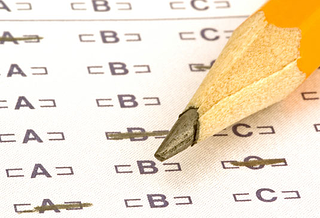
In a recent guest post for the College Solution, we showed how Indiana University has a simple automatic scholarship system to attract top students that might otherwise choose more highly ranked schools. This system is based on an assessment of GPA and ACT score. For certain students, it provides an automatic $11,000 per year scholarship, making IU much more affordable than it otherwise would be. So, I argued that, even if you already have a high ACT score, it could make sense to hire an ACT tutor and try to squeeze out another point, which would bump you into the $11,000 automatic scholarship range, and may impact which school you choose to attend.
In this post, with the implications of part 1 in mind (i.e., significant reduction in the cost of attending IU) I’ll illustrate the potential decision faced by a high school senior from Illinois considering five schools:
College Admissions: The Early App
If you're a college senior or junior, then you probably know that many colleges offer an early application option. There are two main types of early options: early action and early decision. The deadlines for these applications are usually in late October or early November, so now if you are a senior in college now is the time to make the move! For juniors or underclassmen, keep this in mind for the future.
The ACT and SAT: What Should You Do With Your Scores?
College admissions tests are hard! No matter how well you prepared for them the first time, you may not have gotten the score you wanted on your first try. Many people retake the tests at least once in order to learn from their mistakes and improve their scores.
The ACT, the SAT, or Both?
If you just started your junior or senior year of high school, then you have a lot of big decisions coming up in your life! In addition to all your tough classes and rewarding extra curricular activities, you have to juggle the college admissions process. After your high school transcript and personal essays, test scores are the final big piece of the college admissions puzzle. So how can you get the score that will get you into your dream school?
The big decision to make is whether you are going to submit ACT scores, SAT scores, or both. First, check out the requirements of the colleges you will be applying to. Many schools only require that you submit either an ACT or an SAT score, but some are still strict about which one they prefer.
If the choice is yours, then you can consider which test is more suited to your style of thinking and test-taking. Putting some time into deciding which test to take will pay off when you get your highest possible score; there are some big differences between the tests.
Increasing Your Return on Investment in College

Over the past several decades, the cost of college has been rising at a much faster rate than people’s income in the United States. What this means is that it`s effectively become a lot more expensive to go to college. The value of the entire decision to attend is being reevaluated. Many articles are being written about this – here’s one example.
This means a few things. For one, it means that students need to be more and more careful about which colleges they choose to go to and secondly, it means that students need to think long and hard about how to increase their return on investment when they decide to go to college.
Official Launch of ACT/SAT Forum
Thanks for visiting this section of MyGuru's web-site, which is dedicated to helping high school students and parents prepare for the ACT and the SAT.
INVEST IN ACT or SAT TEST PREP
Combining “off-the-shelf” or free test prep materials with an expert MyGuru tutor for 1-1, customized support is the most effective & efficient way to prep.

